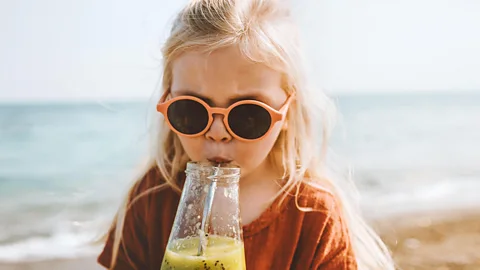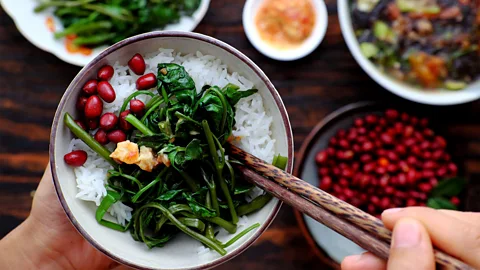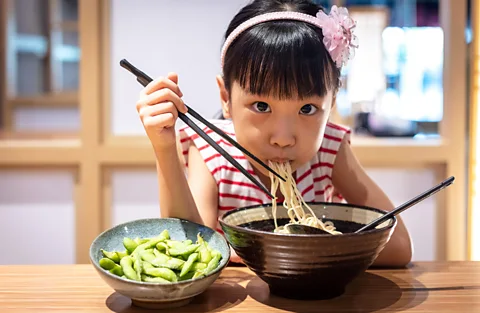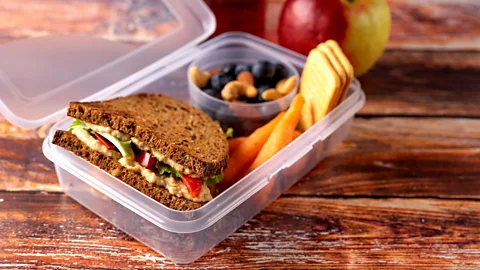Ten things to know about veganism in childhood
 Alamy
AlamyHere's what the experts say about the benefits and risks of veganism in childhood.
Veganism is on the rise in certain parts of the world. Though global data is limited, around 3% of the world's population was estimated to be vegan in 2018. In the US, a 2023 Gallup poll found that 1% of the population said they followed a vegan diet.
More recently, a survey by The Vegan Society found that around 3% of the UK population has a plant-based diet – equivalent to approximately two million people.
There are many well-documented benefits to such a choice. For one, eating meat and dairy is notoriously bad for the planet, while plants offer a much more sustainable solution. Many people have ethical concerns about the welfare of animals bred for consumption, and there is evidence that balanced, varied vegan diets have some health advantages as well.
Nevertheless, isolated cases of severe malnutrition in infants have led some to argue that a vegan diet is unsafe for children.
However, expert opinion on whether children can stay healthy and follow a vegan diet varies around the world. While official dietary associations in both America and the UK argue that a vegan diet, when appropriately planned, is safe for infants and children, in Germany, France, Belgium and Poland, health authorities have some concerns.
Unfortunately, historically there has been little research on the health impact of a plant-based diet for children, but that is finally starting to change, with a host of new studies offering up insights.
But let's back up a little. Vegans do not eat any foods derived from animals. They eschew meat, fish, dairy and eggs, and instead eat a diet based on plants, as well as fungi, algae and bacteria. Think vegetables, fruits, nuts, seeds, beans and legumes, but also bread, pasta and hummus – many foods are accidentally vegan.
So, what does the science say about the effects of a vegan diet in childhood?
1. Research shows there are multiple health benefits to eating a plant-based diet
"The biggest benefits we see relate to cardiovascular health, so the health of your heart and all of your vascular system," says Federica Amati, a nutritional scientist at Imperial College London and head nutritionist at ZOE, a company offering personalised nutrition advice.
"People who follow vegan diets have decreased LDL cholesterol, less blockages in their arteries, and reduced risk of heart attack and strokes. They also tend to be leaner, lighter and have a lower risk of developing obesity," says Amati.
A plant-based diet is also associated with a reduced risk of metabolic diseases like type 2 diabetes, as well as certain cancers such as colorectal cancer.
 Getty Images
Getty ImagesOne of the reasons that plants are so good for us is that they are rich in fibre – a nutrient 90% of us don't get enough of. They are also packed with molecules called polyphenols, which have antioxidant properties and are associated with all sorts of health benefits, such as decreased risk of heart attack, stroke and diabetes.
Another reason some people might benefit from eating less meat and dairy is that animal-based foods tend to be high in saturated fats, which if eaten to excess can raise levels of 'bad' LDL blood cholesterol and increase the risk of heart disease.
"When we think about foods, it's always helpful to think about what they're contributing and in what package," says Amati. "So, if you're eating a steak you're getting a lot of protein, iron, zinc and some micronutrients from that beef." However, Amati points out that along with those things, you're also getting saturated fat and certain chemicals like carnitine – a nutrient which plays a role in energy production – and which is thought to increase inflammation in the gut.
"Whereas, if you look at, say, an edamame [a type of young, immature soybean] you're getting good amounts of protein, but you're also getting fibre, and bioactive compounds that are beneficial for health such as vitamins, minerals and polyphenols," says Amati.
So far, so good for veganism – as long as you have a balanced diet. However, there are potential downsides to relying on plants too heavily for your nutritional needs. There are some essential vitamins and minerals which are only or predominantly found only in meat, fish, dairy and eggs.
2. Vegans can be at risk of B12 deficiency
One challenge is getting enough vitamin B12, a micronutrient made by bacteria in the bodies of animals, and found in animal products such as fish and shellfish, meat, poultry, dairy and eggs. It can also be found in vegan foods such as nutritional yeast or yeast-based spreads (like Marmite), nori seaweed, fortified milks or breakfast cereals, or incorporated into a person's diet via supplements. However, many vegans who do not take supplements are deficient.
Vitamin B12 is essential for nerve transmission in the brain, and you also need it to make healthy red blood cells. Because our bodies can store it, vitamin B12 deficiency can take a while to manifest in adults. But young children can develop it much sooner. For instance, there have been case reports of infants exclusively breast-fed by vegan mothers developing neurological issues due to vitamin B12 deficiency.
 Getty Images
Getty Images"Children have the highest requirement nutritionally, simply because they're literally growing new tissue and building an adult body before our eyes," says Amati.
"During the critical growth phase, if you miss out on certain nutrients, for example B12, then it does impact nerve function and red blood cell formation, so it can impact a child's ability to keep up with learning and for their brain to finish developing properly."
3. There are vegan sources of omega-3
Other nutrients vegan children might miss out on include the omega-3 fatty acids. These polyunsaturated fats form an important part of the bilipid membrane that encases every cell in the body. They're essential for brain function, amongst other things. However, the omega-3s responsible for these health benefits, EPA (eicosapentaenoic acid) and DHA (docosahexaenoic acid), are found only in fish and algae. Another type of omega-3, alpha-linolenic acid (ALA) is found in chia and flax seeds as well as leafy green vegetables. However ALA doesn't have the same health benefits as EPA or DHA.
Other nutrients such as calcium, vitamin D and iodine are present in plants, but in small amounts.
4. Deficiencies can be severe in rare cases
As a consequence, there have been isolated reports of vegan children suffering severe nutritional deficiencies. In 2016, a one-year-old vegan child in Milan, Italy was taken into care after blood tests revealed that he had dangerously low levels of calcium. In 2017, the parents of a seven-month-old baby boy in Belgium were convicted of causing his death, after feeding the infant an exclusive diet of vegetable milk made from oats, buckwheat, rice and quinoa.
The good news for vegans is that many of these nutrients can be supplied via supplements, fortified breakfast cereals and fortified plant milks.
"We can definitely completely get rid of vitamin B12 deficiency by supplementing," says Malgorzata Desmond, a clinical dietician and honorary research fellow at University College London, "That's the easiest thing you can do."
More careful planning may be required to ensure you get enough of other nutrients like iron and zinc. These nutrients are present in leafy green vegetables but are less readily absorbed by the body in plant form compared to when eaten in the form of meat or dairy.
However, whilst it may be possible to for vegan children to get all their nutrients from supplements and a carefully planned diet, one study suggests that this does not always happen in reality.
5. Careful dietary planning is important
In 2021, Desmond and colleagues compared the health of 187 Polish children following either a vegan, vegetarian or omnivorous diet. Two-thirds of the vegan and vegetarian children in the study took vitamin B12 supplements, but overall vegan children had lower calcium levels and were at greater risk of iron, vitamin D and vitamin B12 deficiency.
The study showed that vegan children's health differed in several ways from omnivorous kids who ate meat and dairy. The good news was that vegan children were leaner and had lower cholesterol levels, which could potentially lead to a lower risk of heart disease later in life. They also showed reduced signs of inflammation in their bodies.
6. Vegan children might be slightly less tall
The less good news was that vegan children were between 3-4cm (1.2-1.6in) shorter on average than omnivorous kids, although they were still a normal height for their age. "They have a tendency to be slightly smaller and lighter, but we don't know if those vegan children are going to catch up when they're teenagers," says Desmond.
The most concerning finding, however, was that vegan children had a 6% lower bone mineral density than omnivores. This could put them at risk of osteoporosis and bone fractures in later life. "We only have a short window where we build our bones, which is up until the age of around 25 to 30," says Desmond.
 Getty Images
Getty Images"From then on, our bone mineral content goes downwards. So, if you do not build as much as possible until the age 25, you're going down the hill from a much smaller amount of mineral in your bones."
Research on adult vegans and vegetarians also suggests that they have lower bone mineral density than omnivores, putting them at higher risk of bone fractures.
However, the reason for the mineral deficit isn't fully understood. Both vitamin D and calcium are essential for building and maintaining healthy bones, however Desmond points out that although the vegan children in her 2021 study had lower calcium intakes than vegetarian and omnivore children, it was only slightly lower.
"I think it's a combination of factors," says Desmond. "I don't think it's as easily solved as taking a calcium pill, because it could be due to the quality of plant protein, which is less growth promoting than animal protein."
More like this:
• The hidden biases that drive anti-vegan hatred
Eating more animal protein is thought to stimulate the release of certain growth factors. These molecules – usually proteins – can send signals to the body to encourage it to grow faster. Growth factors play a crucial role in making bones stronger and are involved in both bone growth and repair.
However, Amati points out that these results are just from one study, and therefore the link between a vegan diet in childhood and bone density is yet to be definitively proven. "I think it's an important study, but it's one study on a small amount of children. So, what this study says to me is that we need to actually do more research to really understand what factors in their diet are putting children at higher risk," she says.
7. A carefully planned vegan diet is probably safe for children
Desmond agrees that more research is needed to understand what, if any risk, vegan children face. "I'd say based on what we know now, we can say a vegan diet [in childhood] is safe, but needs to be done responsibly," she says.
This view is shared by Tom Sanders, emeritus professor of nutrition and dietetics at King's College London, who has researched vegan diets since the 1970s. "We showed years ago that kids could be brought up in on vegan diet, providing you avoided the known pitfalls," he says.
So, what are the best foods to eat to make sure you are maximising your intake of nutrients normally found in meat and dairy?
8. Some foods are fortified with important nutrients, such as B12, calcium and vitamin D
When it comes to B12, studies have shown that the best thing is to take supplements, however fortified cereals and plant milks also have B12 added to them so theoretically you could meet your requirements this way.
Plant milks and yoghurts also contain added calcium and vitamin D. Amati also points out that it's important to make sure that children go outside and experience sunlight on their skin during sun-safe hours, when UV levels are at their lowest, as this will encourage vitamin D production.
 Getty Images
Getty ImagesGood plant sources of iron, meanwhile, include legumes, lentils, beans and chickpeas. "Absorption [of iron] can be a bit less efficient, but that can be overcome if you pair it with vitamin C-rich foods like peppers, tomatoes and citrus fruits," says Amati.
For the omega-3 fatty acids, flax seeds, chia seeds and walnuts are good sources of ALA, while vegans can take omega-3 supplements made from seaweed and algae to maximise their intake of EPA and DHA – the omega-3 oils found in fish.
9. It's best to avoid ultra-processed vegan food where possible
It's also best to choose a wide range of plant-based foods rather than pre-packaged, ultra-processed foods marketed specifically as being vegan, explains Amati. "We do sometimes see people who have vegan diets, but they're just buying vegan cheese, and vegan chicken nuggets, so the quality of their diet is still poor," she says.
"If you have an unhealthy vegan diet where you're not thinking about the variety of nutrients, and you're just taking supplements, then you won't have good health outcomes," says Amati.
10. Doing your research is important
Finally, all the experts emphasised the need for parents to educate themselves about nutrients such as B12, vitamin D, calcium and iron so that they could carefully plan their children's diets.
"it's a really good idea to consult healthcare professionals, and specifically a paediatric dietitian or registered nutritionist to plan the diet for your child," says Amati. "It's also important to make sure you regularly monitor children's growth so we can quickly spot if there's any growth or developmental delays."
--
If you liked this story, sign up for The Essential List newsletter – a handpicked selection of features, videos and can't-miss news, delivered to your inbox twice a week.
For more science, technology, environment and health stories from the BBC, follow us on Facebook, X and Instagram.
